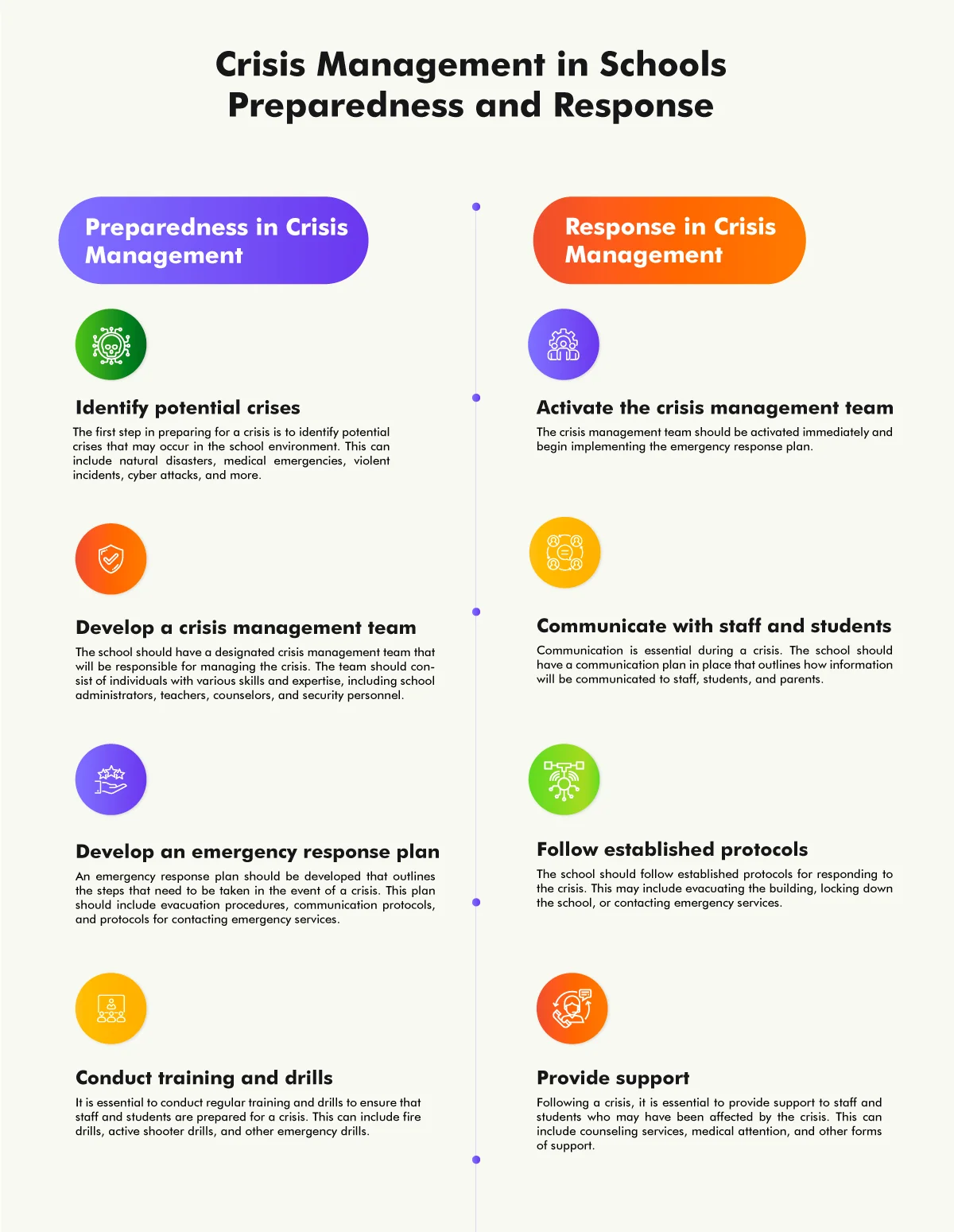
- Student Zone
-
Student Growth serves as a space for students, K-12 educators, parents and school professionals.
Schools are supposed to be a haven for students, teachers, and staff. However, in recent years, schools have been increasingly affected by various crises, including natural disasters, active shooter situations, and cyber-attacks. It is essential for schools to have effective crisis management plans in place to prevent and respond to these crises. In this article, we will discuss crisis management in schools, including the importance of preparedness and response.
Importance of Crisis Management in Schools
Crisis management is the process of planning and executing strategies to prevent, mitigate, and recover from a crisis. In schools, crisis management is crucial to ensure the safety and well-being of students, staff, and the school community. An effective crisis management plan can help schools to:
Prevent or minimize the impact of crises: By having a crisis management plan in place, schools can identify potential crises and take steps to prevent them from occurring or minimize their impact.
Respond quickly and effectively to crises: In the event of a crisis, schools need to respond quickly and effectively to ensure the safety of their students, staff, and the wider community. An effective crisis management plan can help schools to respond in a timely and efficient manner.
Rebuild and recover after a crisis: Following a crisis, schools need to rebuild and recover. A crisis management plan can help schools to develop a recovery plan and ensure that they can continue to provide a safe and secure environment for their students and staff.

Preparedness in Crisis Management
Preparedness is a critical aspect of crisis management. Schools need to be prepared for potential crises by having a crisis management plan in place. A crisis management plan should include the following:
Identify potential crises: The first step in preparing for a crisis is to identify potential crises that may occur in the school environment. This can include natural disasters, medical emergencies, violent incidents, cyber-attacks, and more.
Develop a crisis management team: The school should have a designated crisis management team that will be responsible for managing the crisis. The team should consist of individuals with various skills and expertise, including school administrators, teachers, counsellors, and security personnel.
Develop an emergency response plan: An emergency response plan should be developed that outlines the steps that need to be taken in the event of a crisis. This plan should include evacuation procedures, communication protocols, and protocols for contacting emergency services.
Conduct training and drills: It is essential to conduct regular training and drills to ensure that staff and students are prepared for a crisis. This can include fire drills, active shooter drills, and other emergency drills.
Response in Crisis Management
In the event of a crisis, schools need to respond quickly and effectively to ensure the safety of their students and staff. An effective response should include the following:
Activate the crisis management team: The crisis management team should be activated immediately and begin implementing the emergency response plan.
Communicate with staff and students: Communication is essential during a crisis. The school should have a communication plan in place that outlines how information will be communicated to staff, students, and parents.
Follow established protocols: The school should follow established protocols for responding to the crisis. This may include evacuating the building, locking down the school, or contacting emergency services.
Provide support: Following a crisis, it is essential to provide support to staff and students who may have been affected by the crisis. This can include counselling services, medical attention, and other forms of support.
Conclusion
Crisis management is crucial in schools to ensure the safety and well-being of students, staff, and the wider community. Preparedness and response are both critical aspects of crisis management. Schools need to be prepared for potential crises and have a crisis management plan in place. This plan should include identifying potential crises, developing a crisis management team, creating an emergency response plan, and conducting training and drills.
In the event of a crisis, schools need to respond quickly and effectively. This includes activating the crisis management team, communicating with staff and students, following established protocols, and providing support to those affected by the crisis.
It is important for schools to regularly review and update their crisis management plan to ensure that it remains effective and relevant. Schools should also engage with the wider community to ensure that they are aware of the school's crisis management plan and their role in responding to a crisis.
In summary, crisis management is an essential aspect of ensuring the safety and well-being of students, staff, and the wider school community. Preparedness and response are critical components of effective crisis management. Schools should be prepared for potential crises by having a crisis management plan in place, conducting training and drills, and regularly reviewing and updating the plan. In the event of a crisis, schools need to respond quickly and effectively by activating the crisis management team, communicating with staff and students, following established protocols, and providing support to those affected by the crisis.